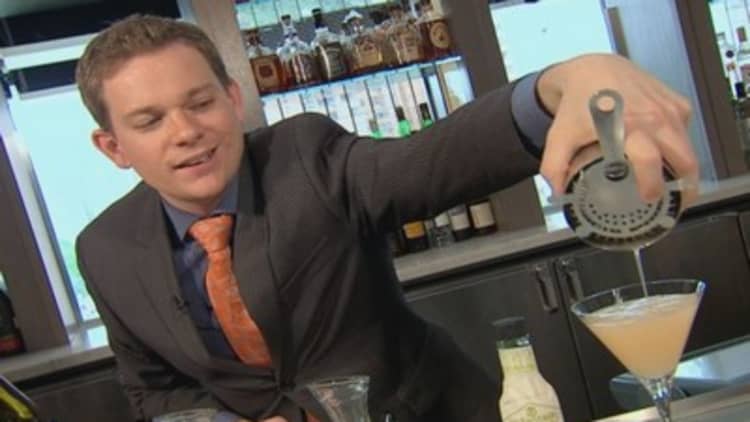CNBC.com will be in New Orleans for the 12th annual Tales of the Cocktail from July 16-20. Check back for our coverage throughout of the trends shaping what you'll drink at home and on the town—and how much you'll spend to do so.
Drinking at home: You're doing it wrong.
It's not surprising that the budget-conscious might choose to do a little at-home mixology. Even classic cocktails at your favorite bar can cost upward of $12 these days, with high-end and craft spirits or unusual ingredients pushing the price even higher. Heck, it's not that unusual to see drinks that exceed the $50 mark.
Read More 6 over-the-top cocktail splurges
Consumers have generally been willing to pay cocktail premiums—which can top 18 percent over the cost of the alcohol—because they perceive added value in the experience, said Kit Yarrow, a professor of psychology and marketing at Golden Gate University in San Francisco.
"What you're paying for is not just the beverage, but the expertise and creativity of the bartender," she said. "You can buy paint, or you can buy a painting. The artistry is so much more than the ingredients."

Still, that adds up. The average American spent $449 on alcoholic beverages from July 2012 through June 2013, according to the Bureau of Labor Statistics; among households earning $150,000 or more, that figure rose to $1,204. It costs even more when you factor in the dining out and entertainment bills that often go hand in hand with a good drink.
Read MoreBartender, make me something with gin
Savings from going the DIY route are clearer for imbibers who prefer a good Scotch or other spirits served neat. Consumers who prefer cocktails, however, may find that their homemade efforts fall short of the value they get at the bar. But there are ways to up your game.
One common mistake: Eyeballing components instead of measuring. "A jigger is key to consistent, delicious cocktails—every professional bartender in the city uses one," said Brad Nugent, beverage director for Center Bar in New York City. Without one, it's easy to get a drink that's un-balanced, with one ingredient overpowering everything else.
Then follow the instructions on technique. Stir cocktails like an Old Fashioned or Negroni; shake those such as a Daiquiri or Tom Collins, said Paul McGee, a partner at Three Dots and a Dash in Chicago, which is a finalist for Best New American Cocktail Bar at Tales of the Cocktail's Spirited Awards. An improperly mixed drink won't taste as it should, nor will one where you skip a step like muddling or straining.
Read MoreFor a fresh summer cocktail, try aloe vera liqueur
Don't cut corners on ingredients. Using a spirit you don't like on its own—whatever the price point—isn't likely to result in a cocktail that's to your taste. "Find out which spirits your favorite bartender uses for your favorite drink," said Lucinda Sterling of Middle Branch in New York City. Quality isn't limited to the alcohol. "Always use fresh citrus juice," McGee said. "Stay away from the bottled stuff or the small plastic lemon or lime bottles with 'real' juice in them. There is no substitute."
But the weirdest mistake bartenders say people make is using the wrong ice. The stuff in your freezer ice cube tray melts too fast. "If you have subpar ice there is a chance that you could over dilute the drink," said Cory Cuff, manager of Cielo Restarant & Bar at Four Seasons Hotel St. Louis in Missouri.
Sterling recommends using flexible silicon molds that produce king-size cubes; for better prep, Nugent boils water and lets it cool before filling trays. "You get water with less air in it, and then ice with less air in it," he said. "It freezes harder." The result? Maximum chill, without a watery drink.
—By CNBC's Kelli B. Grant


